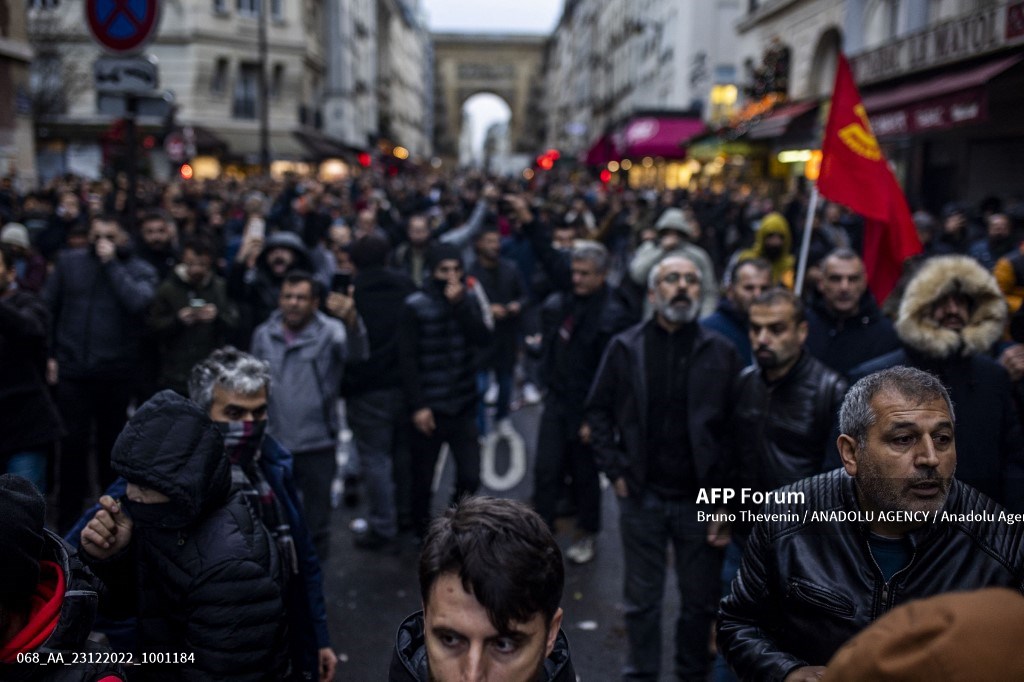Furious Kurdish demonstrators clashed with police in central Paris on Friday after a deadly attack on a community center which has revived the trauma of three unresolved murders in 2013 that many blame on Turkey, Agence France-Presse reported.
Police deployed outside the cultural center used teargas to disperse the protesters who tried to break through a police cordon protecting Interior Minister Gerald Darmanin, AFP reporters said.
Some could be seen throwing objects at police and setting rubbish bins on fire, while several cars were damaged during the disturbances.
The community has been left incensed by the attack, with many — without evidence at this stage — again pointing the finger at Turkey.
They also accuse French authorities of not doing enough to protect them.
“I can’t believe it’s starting again,” Jihan Akdoğan told AFP at the scene. “We knew it would start again,” her brother, Juan Golan Elibeg, 41, added.
Both were referring to the notorious triple murders of three Kurdish women activists almost 10 years ago in the same area of Paris that deeply shook the Kurdish diaspora in France.
In January 2013, three activists from the outlawed Kurdistan Workers’ Party (PKK), including one of the group’s founders, were shot dead at a nearby Kurdish center in what resembled a targeted attack.
A Turkish man was charged with the suspected assassinations afterward, but he died in custody in 2016 before being tried.
The victims’ families have long pointed the finger at Turkey for masterminding the deaths of the three women, who were shot in the head and neck, and at France for failing to investigate properly.
“You aren’t protecting us. We’re being killed!” a young man shouted at police at the scene on Friday as he wept in the street.
Racist violence?
Despite the suspicions in the community, there appears to be no evidence that Friday’s shooting had political motives or was linked to Turkey.
French authorities have been extremely cautious about suggesting a motive for the attack in Paris, with early suspicions being racism.
The suspected gunman is a 69-year-old French retired train driver with a history of violence against foreigners.
In December last year, he was charged with attacking migrants living in tents in eastern Paris with a sword, injuring at least two of them.
The man “was clearly targeting foreigners,” Interior Minister Darmanin told reporters, while adding it was “not certain” that he was aiming to kill “Kurds in particular.”
“We don’t yet know his exact motives,” he said.
Kurdish activism
Some demonstrators could be heard chanting slogans on Friday in support of the PKK, a Kurdish organization designated as terrorist by Ankara, the European Union and others.
The PKK has waged an insurgency against the Turkish state since 1984, initially in support of an independent Kurdish state and latterly for greater Kurdish autonomy within Turkey.
Often described as the world’s largest people without a state, the Kurds are a Muslim ethnic group spread across Syria, Turkey, Iraq and Iran.
Turkey launches regular military operations against the PKK as well as Kurdish groups it accuses of being allies in neighboring Syria and Iraq.
The Kurdish Democratic Council of France, an umbrella Kurdish group headquartered in the cultural center targeted on Friday, also pointed the finger at Turkey on Friday.
“For us there is no doubt that it is a terror attack which has occurred just before the 10th anniversary of the triple murders of three Kurdish activists in Paris,” senior member Agit Polat told AFP.
The group called for a vigil on Friday evening.


